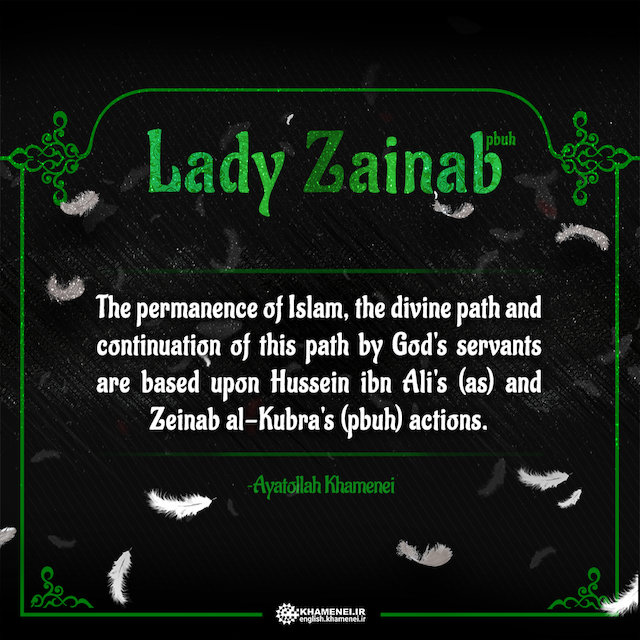These days belong to Zeinab (pbuh). And the mission that Zeinab (pbuh) carried out was divine. That is to say, she went into the heart of threats and hardships for the sake of Allah the Exalted. It behooves us to know and to understand our glorious [religious] history, which has been a source of intellectual blessings so far and will, hopefully, benefit us until the end of time.
Zeinab (pbuh) played an unparalleled role on the way to Karbala with Imam Hussain (as). On the day of Ashura, with all those hardships, and after Imam Hussain (a.s.) had been martyred she also played a significant role. It is impossible to find a similar figure in history. Later on numerous events took place during her captivity, in Kufa, and in Sham. Because of these great selfless efforts, Zeinab al-Kubra (pbuh) gained a prominent position before Allah the Exalted, and this is something that we cannot describe.
In the Holy Quran, Allah the Exalted mentions the names of two women as perfect examples of faith. God also mentions the names of two women as examples of infidelity. "Allah sets forth, for an example to the unbelievers, the wife of Noah and the wife of Lut: They were (respectively) under two of our righteous servants." [The Holy Quran, 66: 10]--These two women exemplify infidelity. That is to say, Allah the Exalted mentions women, not men, as examples of both infidelity and faith. "And Allah sets forth, as an example to those who believe the wife of Pharaoh." [The Holy Quran, 66: 11] He mentions the wife of Pharaoh and Mary as two perfect examples of faith: "And Mary the daughter of Imran." [The Holy Quran, 66: 12]

A brief comparison between Zeinab al-Kubra (pbuh) and the wife of Pharaoh would exhibit the greatness of Zeinab al-Kubra's (pbuh) position. In the Holy Quran the wife of Pharaoh has been recognized as the example of faith for both men and women until the end of time. But, just compare the wife of Pharaoh--who had faith in Moses' prophethood and had been enchanted by his guidance--with Zeinab al-Kubra. When she was tortured by Pharaoh--according to narrations and historical texts, she passed away due to the torture she suffered--she was frustrated by the physical pain. She said, "O my Lord, build for me, in nearness to You, a mansion in the Garden, and save me from Pharaoh and his doings." [The Holy Quran, 66: 11] In fact, she was praying for her death: "And save me from Pharaoh and his doings." This was while her problem was only the physical torture. Unlike Zeinab al-Kubra, she had not suffered the loss of several brothers, two children, and many of her relatives and nephews. She had not watched her dear ones go to the battlefield where they were supposed to be killed. Asiah--the wife of Pharaoh--did not have to endure the psychological pains that Zeinab al-Kubra endured.
On the day of Ashura, Zeinab al-Kubra watched many of her dear ones go to the battlefield and become martyred. She watched Hussain ibn Ali (a.s.), Abbas, Ali Akbar, Qasem, her children, and other dear ones go into the battlefield. After they were martyred, she went endured so much pain: The invasion of the enemy, disrespect, and the responsibility of taking care of the surviving children and women. Is it possible to compare the enormity of this tragedy with physical pain?
But when she was faced with these difficulties, Zeinab al-Kubra (pbuh) did not tell God to save her. She did not say, "O my Lord, save me." On the day of Ashura she said, "O God, accept this from us." While the shredded body of her brother lay in front of her eyes, she tells God, "O God, accept this sacrifice from us." When she was asked to describe what she had seen, she replied, "I saw nothing but beauty." All those tragedies were beautiful to Zeinab al-Kubra because they were from and for God--because they were supposed to promote the word of God. See how different this position, this patience, and this love of justice and truth were compared to Asiah's position described in the Holy Quran. This shows the greatness of Zeinab's position.
This is the nature of actions that are carried out for the sake of God. Therefore, Zeinab's actions are currently a model; her name and achievements will remain until the end of time.
The permanence of Islam, the divine path and continuation of this path by God's servants are based upon Hussain ibn Ali's (as) and Zeinab al-Kubra's (pbuh) actions. That is to say, as a result of the great patience, resistance, and endurance of hardships, you see that religious values have gained a lot of ground in the modern world. All these human values, which are consistent with human nature, in different schools of thought, are rooted in religious values. These values have been promoted by religion. That is the nature of efforts for a divine cause.
Imam Khamenei, Feb 8, 2010


Comment